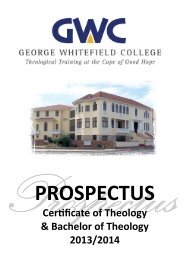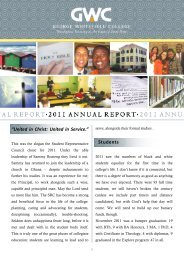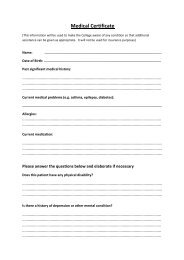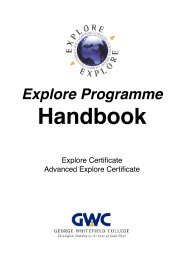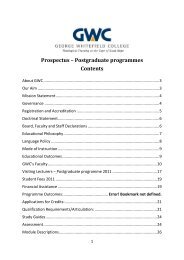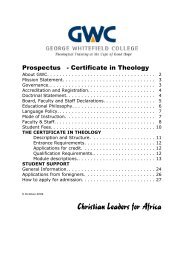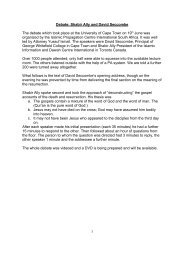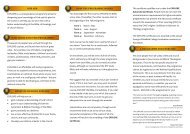Prospectus Bachelor of Theology Christian Leaders for Africa
Prospectus Bachelor of Theology Christian Leaders for Africa
Prospectus Bachelor of Theology Christian Leaders for Africa
Create successful ePaper yourself
Turn your PDF publications into a flip-book with our unique Google optimized e-Paper software.
2.3.2 Old Testament Introduction<br />
Credits: 8<br />
Description:<br />
The aim <strong>of</strong> this subject is to provide you with a broad literary, thematic and historical overview <strong>of</strong> the Old Testament as well as<br />
some <strong>of</strong> the background to it. This will aid you in approaching the Old Testament and help in the development <strong>of</strong> an<br />
understanding <strong>of</strong> the theological dimension <strong>of</strong> the Scriptures. The course examines some <strong>of</strong> the “highlights” and “landmarks” in<br />
the Old Testament, prompting and enabling you to continue reading and studying in this area <strong>for</strong> the rest <strong>of</strong> your academic<br />
career and, hopefully, the rest <strong>of</strong> your life.<br />
Learning Outcomes:<br />
At the end <strong>of</strong> the course you should be able to:<br />
• describe in broad outline the structure <strong>of</strong> the Old Testament canon<br />
• name and briefly describe the literary genre and <strong>for</strong>ms found within the Old Testament<br />
• describe some key Old Testament themes and concepts<br />
• describe the content <strong>of</strong> the books <strong>of</strong> the Old Testament covered in class<br />
• give an outline <strong>of</strong> the overall history covered in the Old Testament period, and the historical setting <strong>of</strong> its individual<br />
books.<br />
2.3.3 New Testament Exegesis I<br />
Credits: 12<br />
Description:<br />
This Bible book study will introduce you to the Gospels as a literary and theological <strong>for</strong>m, familiarise you with the content and<br />
message <strong>of</strong> Mark’s Gospel, and provide a model <strong>for</strong> the exegesis and interpretation <strong>of</strong> the Synoptic Gospels.<br />
Learning Outcomes:<br />
At the end <strong>of</strong> the course you should be able to:<br />
• give an overview <strong>of</strong> the structure and content <strong>of</strong> the Gospel <strong>of</strong> Mark.<br />
• discuss the genre <strong>of</strong> Gospel.<br />
• apply redaction and narrative critical skills to exegete and interpret selected Markan texts in their literary context.<br />
• discuss and explain key Markan themes using the text as a basis <strong>for</strong> discussion.<br />
• think through and explain the significance <strong>of</strong> selected Markan texts <strong>for</strong> contemporary <strong>Christian</strong> thought and conduct.<br />
2.3.4 Old Testament Exegesis I<br />
Credits: 12<br />
Description:<br />
In this course, we begin to develop our skills in Old Testament exegesis and interpretation by focussing on the Book <strong>of</strong><br />
Exodus, the second book in the Pentateuch. The choice <strong>of</strong> Exodus is deliberate <strong>for</strong> it contains a variety <strong>of</strong> literary genre and<br />
has very strong inter-textual links with the New Testament, thus re-en<strong>for</strong>cing interpretive methods learned during the<br />
companion course in Biblical <strong>Theology</strong>.<br />
Learning Outcomes:<br />
At the end <strong>of</strong> the course, you should be able to:<br />
• describe, in broad outline, the structure and contents <strong>of</strong> the book <strong>of</strong> Exodus with reference to the major turning<br />
points in the narrative.<br />
• exegete the English text <strong>of</strong> Exodus in its co-textual and book context and to give its meaning within the context <strong>of</strong> the<br />
canon <strong>of</strong> Scripture.<br />
• explain the theological significance <strong>of</strong> the Exodus within the history <strong>of</strong> Israel and with respect to the <strong>Christian</strong> Life.<br />
2.3.5 Biblical <strong>Theology</strong><br />
Credits: 8<br />
Description:<br />
In this course we will investigate the theological unity <strong>of</strong> the Bible and the implications <strong>of</strong> that unity <strong>for</strong> Biblical interpretation.<br />
The process <strong>of</strong> Biblical interpretation is <strong>of</strong> course a complex one, embracing a number <strong>of</strong> inter-dependent activities across a<br />
variety <strong>of</strong> disciplines. Thus, <strong>for</strong> example, valid Biblical interpretation depends heavily on exegesis, i.e. the historical,<br />
grammatical and literary investigation into the meaning <strong>of</strong> the biblical text. Exegesis concerns itself with what the biblical<br />
authors said as well as how and why they said it. Thus <strong>for</strong> good exegesis a study <strong>of</strong> morphology (the <strong>for</strong>m and structure <strong>of</strong><br />
17



